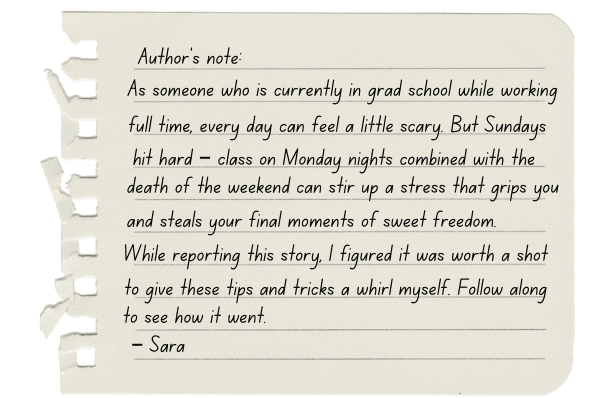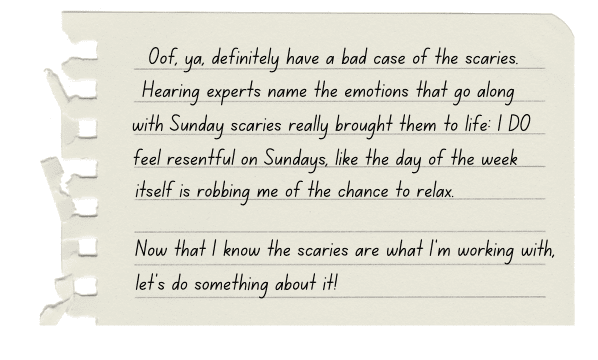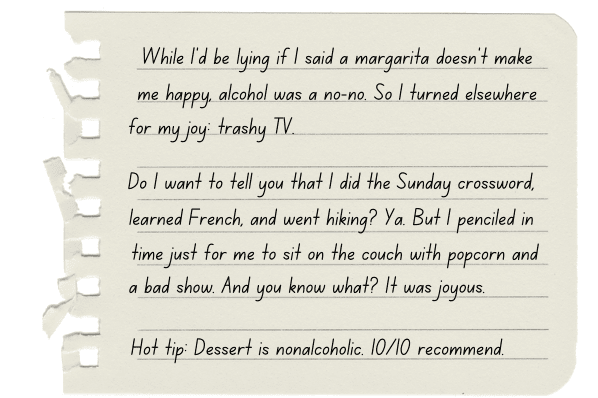Have you ever found yourself reaching for the perfect, ripe tomato at your local Sunday farmers market, smiling and blissful, only to get hit with a sudden sense of impending doom out of nowhere? No, it's not a bad piece of produce — it's the Sunday scaries.
While the name sounds harmless, even a little cute, the scaries are no joke: Sundays for many are spent worrying about the week to come, or dealing with an uncontrollable dread that swallows them whole, making enjoying the end of the weekend nearly impossible.
.png?width=524&height=393&name=Sunday%20Scaries%20(1).png)
And it has a name for a reason according to a 2018 LinkedIn survey, 80% of professionals experience the Sunday scaries. Gen Z-ers and millennials feel the most terror, with 94% and 91% reporting scaries, respectively.
If you're nodding your head along to this all too familiar story, don't worry mental health experts have concrete, actionable ways you can fight, and ultimately defeat, the Sunday scaries and reclaim your weekends.

What are the Sunday scaries?
When exactly did Sundays get so damn scary? The phrase is relatively new: The term first popped onto the scene in 2009 via an Urban Dictionary entry describing a hangover. While being hungover on a Sunday is certainly terrifying, Sunday scaries is now used to describe a broader type of dread that precedes the workweek.
Sunday scaries are so mainstream that they've entered the branding and marketing arena, used to advertise everything from CBD and candles to beauty supplies and apparel.
Regardless of how the word was invented, though, the scaries are rooted in common human emotions that existed long before Urban Dictionary.
"The term 'Sunday scaries' is often used to describe the unpleasant feelings one might have in anticipation of starting a new week," says clinical psychologist Dr. Rachel Edelman. "Some of those feelings might include anxiety, dread, sadness, resentment, frustration or anger. It's a cognitive, emotional, and physiological experience that includes negative thoughts or images, unpleasant emotions, and unpleasant feelings in the body."
While the term is not a clinical diagnosis, it is a phenomenon that can represent other underlying problems, and needs to be addressed and treated with care.
Once you've identified that the emotions you're experiencing are in fact the Sunday scaries, the next step is understanding the root causes so that you can better address, and ultimately help treat, the sensation.

What causes the Sunday scaries?
We know what the scaries feel like, but what is actually behind the unpleasant emotions?
The Sunday scaries might occur because a person is dissatisfied with their job, burned out, didn't recharge enough during their time off, or struggles with the transition from free time to work responsibilities, says Edelman. They could also occur if someone is working in a toxic environment that is negatively impacting their well-being. Spending 40+ hours in a toxic work environment takes a serious toll on mental and physical health.
And if the scaries can stem from burnout, it would make sense why they are such a common experience. In The Hustle's survey of more than 300 entrepreneurs, 63% of business owners reported that they've dealt with or are currently dealing with burnout.
The survey showed that a variety of emotional factors negatively impact entrepreneurs and accelerate burnout, including financial concerns (22%), work-life balance (15%), and day-to-day stress (15%).
Regardless of the reason, the first step towards remedying Sunday scaries is unpacking what's behind the foreboding sensations so you can understand how you might fix it.
"Feelings can provide important information about the situations we find ourselves in," notes Edelman. "Anxiety and dread could be a communication to ourselves that the work itself isn't satisfying or maybe that we are working in a toxic environment. Take some time to consider the root cause of your Sunday scaries," she advises.
Experts agree that those who already suffer from mental illnesses could be more susceptible to experiencing the Sunday scaries.
"Individuals with mental health challenges such as anxiety or depression might be especially vulnerable to an anxious or low mood before the start of a new week," says Edelman. "The Sunday scaries alone don't necessarily indicate a more serious mental health problem, but it can be a sign of a bigger issue if the feelings are persistent, distressing, and impact your ability to function."
.png?width=598&name=SS3_Final%20(1).png)
How to deal with Sunday scaries
Implementing concrete practices into your week can make a big difference when fighting that end-of-weekend anxiety. Everyone is different try various tools to see what is effective and workable for you.
Some actionable tips that experts shared with The Hustle include:
1.) Keep a normal sleep schedule.
Straying too far from your weekday sleep routine can throw a wrench in your rhythm and cause undue stress come Sunday. If you normally go to bed at 10pm and wake up for work at 7am, going on a 4am bender on Saturday can make it harder to fall asleep the next night.
Anticipating or experiencing a sleepless Sunday night can exacerbate anxiety going into the week, explains Edelman.
2.) Assess your time.
Take a detailed inventory of your work life, note how many hours you're actually working, and where you may be able to give yourself a break during the week. Separate out the real and imagined expectations of your job, and try to be honest with yourself when assessing your schedule so you can tweak it to fit your needs.
"Is there any time or space that you can reclaim?" asks Saba Lurie, founder of Take Root Therapy. "Maybe it's dinner once a week with friends instead of in front of your computer, or taking a class once a week, or exercising 30 minutes a day or 5 minutes a day. "
3.) Limit drugs and alcohol.
Most drugs and alcohol are associated with anxiety when you stop using them, says Edelman. When anxiety fueled by a hangover collides with worried thoughts about the week ahead, you're more likely to experience the Sunday scaries.
For a calmer Sunday, reach for sparkling water or kombucha instead of a cocktail when painting the town red.
4.) Seek out joy.
"While working less could reduce stress, sometimes the solution lies in having more of something positive. Sprinkle pleasure and joy throughout the week to figure out how to make it work better for you," says Lurie.
Many of us don't have the option to just stop working, and maybe your work even brings you joy, but you need to make sure there are moments that are just for you and that there's time to rest, be bored, and seek pleasure.
Focus on your joy, look for the little things that uplift your spirit, and practice a mindset of gratitude, advises Lurie. Whether it's simply noting the things you feel thankful for in your mind, writing them down, or saying it out loud, it can be helpful to channel positive thoughts throughout the week to combat stress.

5.) Keep good habits.
Like any other day of the week, it's important to maintain healthy habits on Sunday to combat the scaries.
According to Edelman, Whether you like to fit in every possible activity or spend 48 hours on the couch, balancing your days with rest, healthy foods, physical activity, and socializing is important for feeling good at the end of a weekend.
6.) Go to therapy.
"Therapy can be really beneficial to anyone, and you don't need to wait until you're suffering to seek support," says Lurie. "I would encourage people to consider therapy especially if they're having a hard time understanding what's going on for them, or why they're feeling certain ways. Working with therapists can help you develop those insights."
Sunday scaries or not, therapy can be a lifelong tool for tackling a variety of obstacles, and gives people a safe place to talk it out and get an outside opinion.
7.) Log your thoughts.
If you are still trying to pinpoint exactly what is making your stomach turn every Sunday, Edelman notes that spending some time with your journal can be a helpful exercise.
"Pay attention to the thoughts that you're having when you're experiencing the Sunday scaries," advises Edelman. "If your thoughts reflect negative anticipation of the week ahead, take some time to write down those thoughts and evaluate their accuracy."
Edelman explains that concentrating on the accuracy of your thoughts is a helpful way to ground them in reality: Anxiety can make us jump to conclusions, such as anticipating the worst-case scenario or assuming the worst in someone else. Fighting those thought patterns can aid in alleviating stress.
8.) Be mindful.
Whether through meditation, or simply taking a quiet moment to yourself, practicing mindfulness can be a helpful tool for combating any type of stress, scaries included.
Like the rest of these practices, mindfulness can come in handy anytime, anywhere, and is a valuable skill to master.
"Practicing mindfulness regularly, and particularly on Sundays if you're suffering from the Sunday scaries, can provide insight as to why you're feeling the way you are. It can also help you notice what, if anything, can be changed," Edelman says.
Try meditating whenever you're feeling overwhelmed even in the middle of a workday to help you come back and focus on the present.
 Scary no more
Scary no more
With so many options available, the Sunday scaries don't have to be something that ruins every weekend.
While you test what works for you whether that's meditating, dinner with friends, or finding a therapist just remember to be patient, and cut yourself some slack.
"It can be really challenging to change, even when we have an understanding of what it is we want to change," says Lurie. "It doesn't happen overnight, so I would encourage people to be really compassionate and patient with themselves and to give themselves grace."

.jpg?width=48&height=48&name=IMG_2563%20(1).jpg)

-1.png)

.png)

.png)

.png)

